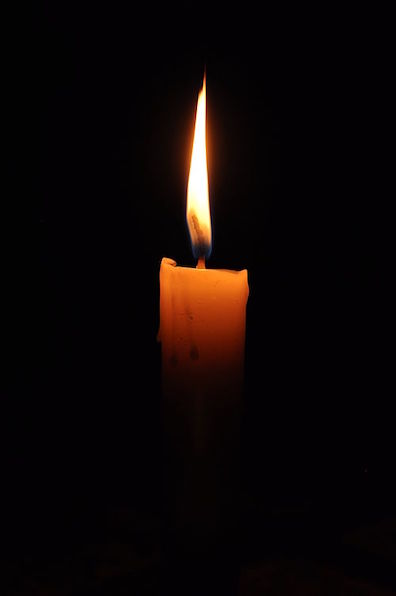The wry, understated humor that has entered Ithaca with
the comments about Bloom's missing key continues as the
narrator describes Stephen watching Bloom through the kitchen
window. He sees "a man regulating a gasflame of 14 CP," and
then "a man leaving the kitchen holding a candle of 1 CP." The
abbreviation stands for candlepower, a recognized scientific
measure of brightness. But there is something more than a
little absurd about defining the power of one candle as one
candlepower.
This paragraph of Ithaca is almost totally
unnecessary. The previous one has already described Bloom
gaining entry into the kitchen, lighting a match, turning on a
ventcock, lighting and adjusting a coal gas flame, and finally
lighting a candle. Looking through the window, Stephen notes
all these things and nothing else, except for "a man removing
in turn each of his two boots." But the narrator, who has
maniacally described all the details of Bloom's weight and the
time at which it was measured, now directs his passion for
quantification to the two flames visible through the window
panes.
The term "candlepower" was first defined by the UK's
Metropolitan Gas Act of 1860 as the light emitted by a
particular size of spermaceti candle. The French and German
governments had their own ways of measuring light intensity,
and throughout the first half of the 20th century
international commissions labored to define universally
acceptable standards. The current standard, agreed upon in
1948, is the candela, which is very slightly greater than the
old British candlepower.
Some strained justification could perhaps be offered for a
narrative that defines exactly how many government-measured
spermaceti candles it would take to equal the light produced
by Bloom's gas flame. But even if one assumes that the light
of Bloom's candle happens to be exactly equivalent in
brightness to a government-calibrated spermaceti candle,
calling it "a candle of 1 CP" takes the narration
beyond obsessive quantification into pure pedantry. Of course
one candle emits the light of one candle!
It is becoming clear that the narrator of Ithaca is,
if not exactly unreliable, then at least not someone in whom
one should repose soberly credulous trust. Children learning
things through catechisms are conditioned to
believe that all the questions are important and all the
answers reliably informative. People reading Ithaca
learn that some questions may be unnecessary or even bizarre,
and some answers are invitations to laugh at the absurdity of
the whole exercise.
